Home Tags Posts tagged with "nerve agent sarin"
nerve agent sarin
UN chemical weapons inspectors are expected to return to Syria on Wednesday, according to Russian government.
Deputy Foreign Minister Sergei Ryabkov said they would investigate alleged chemical weapons attacks at Khan al-Assal, Sheikh Maqsoud and Saraqeb, according to the Interfax news agency.
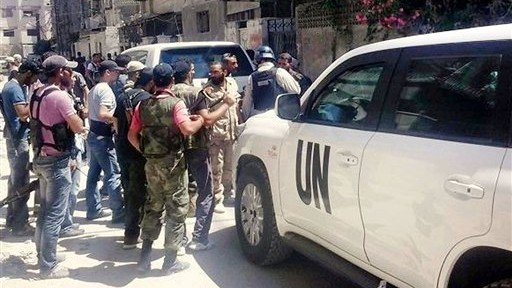
UN chemical weapons inspectors are expected to return to Syria
They had been preparing to do so when chemical weapons were fired at suburbs of Damascus on August 21.
Last week, the UN inspectors confirmed the nerve agent sarin was used in that attack.
They were not asked to ascertain who fired the sarin-filled artillery rockets that hit eastern and western parts of the Ghouta agricultural belt, killing hundreds of people, but Western powers have claimed it could only have been carried out by Syrian government forces.
The Syrian and Russian governments have challenged them to present firm evidence, and instead claimed that rebels were responsible.
[youtube VFlyMi-fWQY]
Syria has given Russia new “material evidence” that rebels have used chemical weapons, a Russian minister has said.
Deputy Foreign Minister Sergei Ryabkov also said a report by UN inspectors on the alleged use of chemical weapons was “politicized, biased and one-sided”.
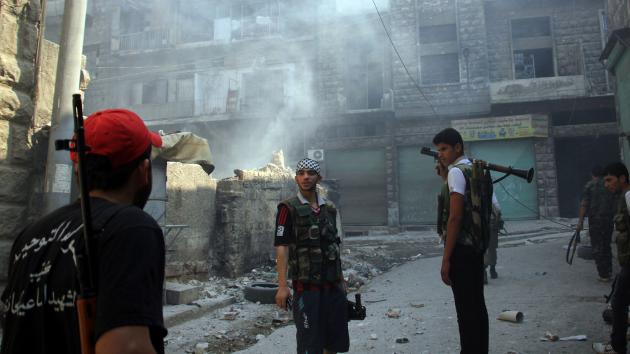
Syria has given Russia new “material evidence” that rebels have used chemical weapons
Sergei Ryabkov said the inspectors had only looked at evidence of an alleged attack on August 21, not three previous incidents.
The UN team found that the nerve agent Sarin was used in the August 21 attack.
The report, however, did not apportion blame for the attack but Western nations blame the government forces of Syrian President Bashar al-Assad.
Damascus – backed by Russia – says opposition forces are to blame.
[youtube 7PawEKRbacU]
A UN report has confirmed “unequivocally and objectively” that chemical weapons have been used in Syria.
The report says sarin gas was used in a rocket attack in the Syrian capital, Damascus, last month, although it has not attributed blame.
“This is a war crime,” Secretary-General Ban Ki-moon said.
US allegations that the government was responsible led to threats of military action and then a US-Russia deal for Syria to make safe its chemical arms.
World powers will now try to hammer out a UN Security Council resolution.
Earlier, UN investigators said they were probing 14 alleged chemical attacks in Syria since September 2011.
Meanwhile, Turkey said it had shot down a Syrian helicopter close to its border. Deputy PM Bulent Arinc said the aircraft was engaged by fighter jets after violating Turkish air space.
Ban Ki-moon has been briefing the Security Council on the report, and is then expected to address the media.
He said he was submitting the UN mission’s report “with a heavy heart”.
“The mission has concluded that chemical weapons were used on a relatively large scale in the Ghouta area of Damascus [on 21 August]… The attack resulted in numerous casualties, particularly among civilians.”
Ban Ki-moon spoke of the suffering of the victims.
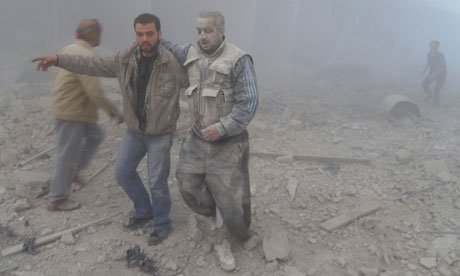
UN report confirms sarin gas was used in a rocket attack in Damascus last month
“Survivors reported that following an attack with shelling, they quickly experienced a range of symptoms, including shortness of breath, disorientation, eye irritation, blurred vision, nausea, vomiting and general weakness.
“Many eventually lost consciousness. First responders described seeing a large number of individuals lying on the ground, many of them dead or unconscious.”
The UN investigators examined many samples from the scene.
Ban Ki-moon said: “On the basis of its analysis, the mission concluded that it – and I quote – <<collected clear and convincing evidence that surface-to-surface rockets containing the nerve agent sarin were used in the Ein Tarma, Moadamiyah and Zalmalka in the Ghouta area of Damascus>>.”
Ban Ki-moon added: “I trust all can join me in condemning this despicable crime. The international community has a responsibility to hold the perpetrators accountable.”
He said the mission was unable to verify the number of casualties, but referred to the “terrible loss of life on 21 August”.
He added: “This is the most significant confirmed use of chemical weapons against civilians since Saddam Hussein used them in Halabja in 1988.”
Assigning blame for the attack in Ghouta was not part of the inspectors’ remit.
However, diplomats have suggested the way the facts are reported may point to the Syrian government as the perpetrators.
Syrian President Bashar al-Assad has denied allegations his government was behind the attack, instead blaming the rebels.
Earlier, Paulo Pinheiro, the chairman of the UN Commission of Inquiry on Syria, said the commission had been investigating 14 alleged chemical attacks since it began monitoring Syrian human rights abuses in September 2011.
Paulo Pinheiro said investigators had not so far been able to assign blame and were awaiting details from Monday’s UN report.
He said the commission believed both President Assad’s government and the rebels were responsible for war crimes, but that the regime alone had perpetrated crimes against humanity.
War crimes, including mass executions, rape and torture, were continuing, the commission said.
Its investigators said a referral to the International Criminal Court was imperative.
French President Francois Hollande and his Foreign Minister Laurent Fabius earlier met British Foreign Secretary William Hague and US Secretary of State John Kerry in Paris on Monday to discuss the Syrian crisis.
The UN Security Council is expected to draft a resolution in the coming days.
[youtube UW8CFk3E-Ic]
Secretary of State John Kerry says the US has evidence that the chemical nerve agent sarin was used in a deadly attack in Damascus last month.
John Kerry said samples from hair and blood gathered after the attack “tested positive for signatures of sarin”.
The US blames the Syrian government for the August 21 attack.
President Barack Obama has vowed punitive action but wants Congress to vote on it first.
Syria dismissed the delay and said it was ready for any strike.
UN experts have been in Syria gathering evidence to determine whether chemical weapons attacks have taken place on various occasions. They have now arrived in the Netherlands with samples for analysis.
The biggest and deadliest apparent attack took place on August 21 in east Damascus. The US says more than 1,400 people were killed.
Washington said only the Damascus government has the capacity to launch such an attack.
Syria has denied it was responsible and blames the rebels.
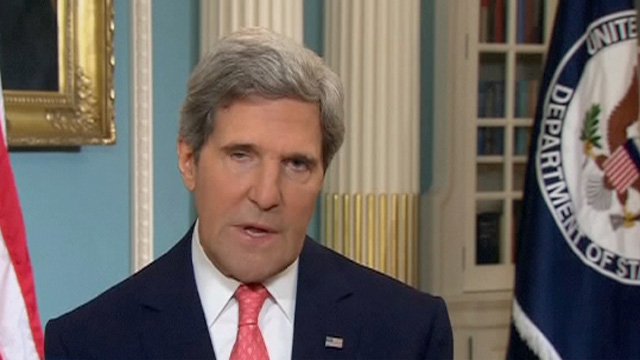
John Kerry says the US has evidence that the chemical nerve agent sarin was used in a deadly attack in Damascus last month
John Kerry implied that the US evidence was supplied by its own sources, rather than via the UN inspectors.
“In the last 24 hours, we have learned through samples that were provided to the United States that have now been tested from first responders in east Damascus and hair samples and blood samples have tested positive for signatures of Sarin,” Kerry said on NBC’s Meet The Press.
“So this case is building and this case will build.”
The US has previously said it had similar evidence of sarin use in other attacks.
John Kerry also said he was confident that Congress would give its approval for the US to launch strikes against Syria after it reconvenes on September 9.
Congressmen “will do what is right because they understand the stakes”, he said, declining to explain whether Barack Obama would press ahead even if Congress voted against.
Syrian Deputy Foreign Minister Faisal Mekdad said Barack Obama’s decision to delay the strikes pending a vote in Congress was just “a political and media manoeuvre”.
Syrian President Bashar al-Assad remained defiant on Sunday, saying: “Syria… is capable of facing up to any external aggression just as it faces up to internal aggression every day, in the form of terrorist groups and those that support them.”
The Syrian government has been fighting rebel forces since March 2011.
More than 100,000 people are estimated to have died in the conflict, and at least 1.7 million have become refugees.
Syria is known to have extensive supplies of chemical weapons.
Barack Obama has often said that using them would cross a “red line”, prompting US intervention.
On Saturday, Barack Obama said any action would be limited, ruling out a ground invasion.
Congress is due to reconvene on September 9, meaning any military operation would not happen until then.
The opposition Syrian National Coalition (SNC) said President Barack Obama’s decision to delay any strikes in Syria was a “failure in leadership” and could “embolden” the forces of President Bashar al-Assad.
Arab League foreign ministers are meeting in Cairo on Sunday, with Saudi Arabia urging them to back calls for strikes against Syria.
The UK has ruled out taking part in any attack, after PM David Cameron failed to win the support of parliament last week.
That leaves France as the only other major power that has said it could strike against Syria – though it says it will not act on its own before the vote in the US Congress.
[youtube ZZal5X6Wpnw]
The White House has announced today that President Barack Obama has approved for the first time a direct military aid to the Syrian opposition.
President Barack Obama made the decision after his administration concluded Syrian forces under President Bashar al-Assad were using chemical weapons, a spokesman said.
Ben Rhodes did not give details about the military aid other than to say it would be “different in scope and scale to what we have provided before”.
Russia said the US claims on Syria’s chemical weapons use were unconvincing.
Yury Ushakov, a senior aide to President Vladimir Putin, told reporters that Washington had provided Moscow with its evidence, but “what was presented…. does not look convincing to us”.
The US announcement is one that the Syrian opposition has been pushing and praying for months.
It seems clear that President Barack Obama has finally been persuaded, as Britain and France have argued, that the battlefield cannot be allowed to tilt strongly in the regime’s favor, as is currently happening.
Washington’s “clear” statement was welcomed by NATO Secretary General Anders Fogh Rasmussen, who urged Syria to let the UN “investigate all reports of chemical weapons use”.
British Foreign Secretary William Hague said the UK agreed with Washington’s assessment and said an urgent response to the Syria crisis would be discussed at the G8 this week.
But a spokesperson for UN Secretary General Ban Ki-moon told said that he remained against “any further militarization” of the conflict in Syria, saying the people there need peace not more weapons.
Ben Rhodes, a deputy national security adviser to Barack Obama, said the US intelligence community believed the “Assad regime has used chemical weapons, including the nerve agent sarin, on a small scale against the opposition multiple times over the last year”.
He said intelligence officials had a “high confidence” in their assessment, and also estimated that 100 to 150 people had died from chemical weapons attacks, “however, casualty data is likely incomplete”.
“We have consistently said the use of chemical weapons violates international norms and crosses red lines that have existed in the international community for decades,” Ben Rhodes said.
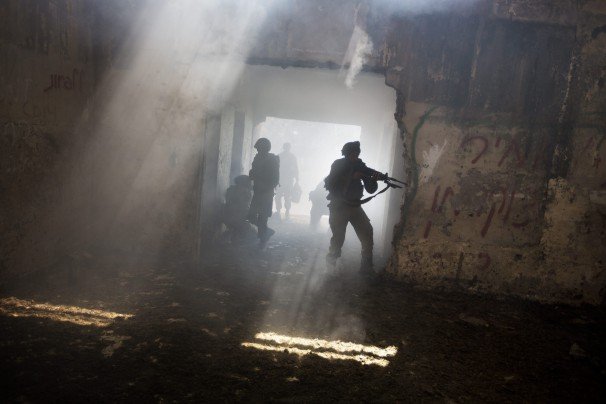
President Barack Obama has approved for the first time a direct military aid to the Syrian opposition
Ben Rhodes said President Barack Obama had made the decision to increase assistance, including “military support”, to the Supreme Military Council (SMC) and Syrian Opposition Coalition.
He did not give details of the aid, but administration officials have been quoted by US media as saying it will most likely include sending small arms and ammunition.
The New York Times quoted US officials as saying that Washington could provide anti-tank weapons.
Syria’s rebels have been calling for both anti-tank and anti-aircraft weaponry.
The Wall Street Journal reported that Washington is also considering a no-fly zone inside Syria, possibly near the border with Jordan, that would protect refugees and rebels who are training there.
When asked whether Barack Obama would back a no-fly zone over Syria, Ben Rhodes said one would not make a “huge difference” on the ground – and would be costly.
He said further actions would be taken “on our own timeline.”
The CIA is expected to co-ordinate delivery of the military equipment and train the rebel soldiers in how to use it.
Until now, the US has limited its help to rebel forces by providing rations and medical supplies.
Ben Rhodes said the White House hoped the increased support would bolster the effectiveness and legitimacy of both the political and military arms of Syria’s rebels, and said the US was “comfortable” working with SMC chief Gen Salim Idris.
“It’s been important to work through them while aiming to isolate some of the more extremist elements of the opposition, such as al-Nusra,” he said.
The US decision marks a significant escalation of the proxy war that has been gathering pace in Syria, our Beirut correspondent says.
The support of the West’s regional allies, Qatar and Saudi Arabia, had helped the rebels in the days after the uprising became militarized.
But the tide turned after the Assad government turned to Moscow and Tehran for help. Hezbollah fighters have also been involved in the government’s counter-offensive.
Now the West is lining up to try and help the rebels, but that is likely to take many months with more bloodshed and destruction.
The White House announcement immediately shook up the ongoing debate in Washington DC over how the US might provide assistance to the rebels.
Republican Senators John McCain and Lindsey Graham, who have been particularly strident in their calls for military aid, said the finding must change US policy in Syria. They called for further action, saying US credibility was on the line.
“A decision to provide lethal assistance, especially ammunition and heavy weapons, to opposition forces in Syria is long overdue, and we hope the president will take this urgently needed step,” they said in a joint statement.
“But providing arms alone is not sufficient. The president must rally an international coalition to take military actions to degrade Assad’s ability to use airpower and ballistic missiles and to move and resupply his forces around the battlefield by air.”
The White House announcement came on the same day the UN said the number of those killed in the Syrian conflict had risen to more than 93,000 people.
A UN report released on Thursday found at least 5,000 people have been dying in Syria every month since last July, with 30,000 killed since November.
More than 80% of those killed were men, but the UN’s Office of the High Commissioner for Human Rights (OHCHR) says it has also documented the deaths of more than 1,700 children under the age of 10.
[youtube RDCatzB0ZhI]
According to leading United Nations investigator Carla del Ponte, testimony from victims of the Syrian conflict suggests rebels have used the nerve agent sarin.
Carla del Ponte told Swiss TV there were “strong, concrete suspicions but not yet incontrovertible proof”.
However, she said her panel had not yet seen evidence of government forces using chemical weapons.
Syria has recently come under growing Western pressure over the alleged use of such weapons.
Carla del Ponte, who serves on the UN Independent International Commission of Inquiry on Syria, said in an interview with Swiss-Italian TV: “Our investigators have been in neighboring countries interviewing victims, doctors and field hospitals.

Carla del Ponte said there were strong suspicions that Syrian rebels used sarin
“According to their report of last week, which I have seen, there are strong, concrete suspicions but not yet incontrovertible proof of the use of sarin gas, from the way the victims were treated.”
Carla del Ponte, a former Swiss attorney-general and prosecutor with the International Criminal Tribunal for the former Yugoslavia, did not rule out the possibility that government troops might also have used chemical weapons, but said further investigation was needed.
She gave no details of when or where sarin may have been used.
Her commission was established in August 2011 to examine alleged violations of human rights in the Syrian conflict since March 2011 and is due to issue its latest report to the UN Human Rights Council in Geneva in June.
A separate United Nations team was established to look specifically into the issue of chemical weapons.
The team is ready to go to Syria but wants unconditional access with the right to inquire into all credible allegations.
Both the Syrian government and the rebels have in the past accused each other using chemical weapons.
Sarin, a colorless, odorless gas which can cause respiratory arrest and death, is classed as a weapon of mass destruction and is banned under international law.
[youtube B8unjc3XwS0]
Syria may have used chemical weapons against rebels, the White House has said.
US intelligence agencies believe “with varying degrees of confidence” that the nerve agent sarin had been deployed on a “small scale”, and did not say where or when it had been used.
The White House has warned chemical weapons use would be a “red line” for possible intervention, but says this intelligence does not represent proof.
Republicans in Congress called on Thursday for a strong US response.
The assessment was made in letters to lawmakers on Thursday signed by Miguel Rodriguez, White House director of the office of legislative affairs.
“Our intelligence community does assess, with varying degrees of confidence, that the Syrian regime has used chemical weapons on a small scale in Syria, specifically, the chemical agent sarin,” one of the letters said.
But it added: “Given the stakes involved, and what we have learned from our own recent experiences, intelligence assessments alone are not sufficient – only credible and corroborated facts that provide us with some degree of certainty will guide our decision-making.”
The phrase “varying degrees of confidence” is normally used to reflect differences in opinion within the intelligence community.

Syria may have used chemical weapons against rebels, the White House has said
Speaking to reporters in Abu Dhabi on Thursday, US Defence Secretary Chuck Hagel told reporters in Abu Dhabi that the use of sarin “violates every convention of warfare”.
Secretary of State John Kerry said there had been two instances of chemical weapons use in Syria.
The UK Foreign Office echoed the US claims, saying it had “limited but persuasive information from various sources” of chemical weapons use in Syria.
It is understood that Britain obtained samples from inside Syria that have been tested by the Defence Science and Technology Laboratory at Porton Down, Wiltshire.
“Material from inside Syria tested positive for sarin,” a Foreign Office spokesman said.
Syria is believed to possess large quantities of chemical weapons and there has been heightened concern among the international community in recent months about the safety of the stockpiles.
Although there have been numerous accusations, there has so far not been any confirmation that chemical weapons have been used during Syria’s two-year-old conflict.
President Barack Obama warned in December that Syrian President Bashar al-Assad would face “consequences” if he used such weapons.
The letters released on Thursday were sent to powerful US senators John McCain and Carl Levin.
In response, Senator John McCain told reporters: “It’s pretty obvious that red line has been crossed.”
John McCain recommended arming the opposition, a step the White House has been reluctant to take. He also urged taking steps to ensure that Syria’s chemical weapons did not fall into the wrong hands.
“It does not mean boots on the ground,” the Arizona senator added.
Democrat Dianne Feinstein, chair of the Senate Intelligence Committee, called for international action to help secure Syria’s stockpile of chemical arms.
Robert Menendez, the Democratic Chairman of the Senate Foreign Relations Committee, said options included “an internationally recognized no-fly zone, providing lethal assistance to vetted opposition forces, and sanctioning the transfer of arms to the regime”.
White House officials said the US would consult with allies and seek more evidence to confirm their intelligence.
On Tuesday, a senior Israeli military official accused Syrian forces of having used the nerve agent sarin against rebels several times. People can normally recover from small doses.
Speaking at a security conference in Jerusalem, Brigadier General Itai Brun cited photographs of victims foaming at the mouth and with constricted pupils and other unspecified symptoms.
Syria’s government and rebels have accused each other of using chemical weapons. A UN team is trying to enter Syria to investigate.
Sarin is a colorless and highly toxic nerve agent that can cause convulsions, paralysis and death within minutes if it is absorbed through inhalation, ingestion, or contact with skin or eyes.
According to the UN, at least 70,000 people have been killed in the Syrian conflict.
[youtube t6wXfhtMnms]







